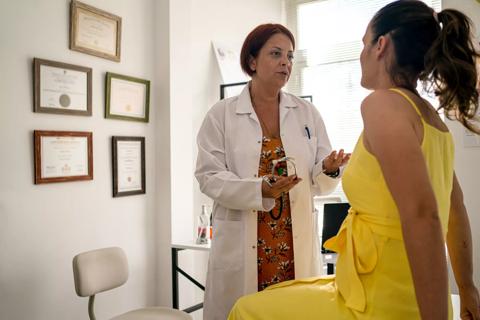If left untreated, you risk complications, early labor and passing the infection to your baby

In the U.S., sexually transmitted infections are at an all-time high. If you know you’re living with a sexually transmitted infection (STI) and are hoping to have a baby, you may be nervous about whether (and how) it will affect your pregnancy. Or maybe you’re already pregnant, and you haven’t yet been tested for STIs. But when you’re pregnant or trying to become pregnant, it’s critical to have that conversation with your healthcare provider.
Cleveland Clinic is a non-profit academic medical center. Advertising on our site helps support our mission. We do not endorse non-Cleveland Clinic products or services. Policy
Letting an STI go untreated can affect your health and your baby’s health, as some of these infections can be passed on during both pregnancy and childbirth. But with treatment, many STIs can be cured, and others can be managed to prevent passing them on.
Ob/Gyn and infectious disease expert Oluwatosin Goje, MD, explains the risks of having an STI during pregnancy and how to get treatment.
Yes. A number of STIs can affect your pregnancy and delivery, as well as fetal development. You can also pass an STI along to the fetus, or your baby can become infected during childbirth.
“The U.S. Centers for Disease Control (CDC) recommends that young adults under age 25 be screened yearly,” Dr. Goje says. “Those older than 25 who have any risk factors or who feel they’ve been exposed should also be screened.”
The CDC also recommends syphilis screening, in particular, for anyone who’s pregnant. If you live in the U.S., this screening will be done during your first visit to your obstetrician, but it’s always smart to ask to be screened for other STIs, too.
Different STIs have different possible impacts on your pregnancy, fetal development and the health of your newborn. Here are some specific terms you’ll hear as we talk about the risks of STIs during pregnancy:
But there are other risks, too. Dr. Goje explains how specific STIs can affect you in pregnancy and what impact they can have on the developing fetus.
According to the CDC, chlamydia is the most frequently reported STI in the United States.
“Many times, chlamydia is asymptomatic,” Dr. Goje says. “People often don’t know they have it until they’re screened for it.”
Though it isn’t thought to affect pregnancy or fetal development, it puts you at risk for preterm rupture of membranes, preterm labor and a baby born with low birth weight.
You can also pass chlamydia to your newborn during childbirth — even if you have a cesarean section (c-section). Babies who are exposed to chlamydia can develop pink eye and pneumonia.
“Chlamydia can be treated immediately with an antibiotic called azithromycin, which is a one-time medication,” Dr. Goje says. “Newborn babies are also given antibiotic eye ointment after birth to prevent infections.”
Genital herpes (HSV-2) is a lifelong condition. Though it doesn’t affect fetal development, active herpes lesions are contagious and can be passed to your baby during childbirth. It also puts your newborn at risk for blindness, brain damage, skin infections and, if left untreated, death.
“If you have herpes, it’s very important to tell your Ob/Gyn so they can keep a close eye on you throughout your pregnancy,” Dr. Goje advises.
To help prevent an outbreak during delivery, your healthcare provider will likely recommend that you start taking a daily antiviral medication once you reach 36 weeks, as recommended by the American College of Obstetricians and Gynecologists. Your provider will probably recommend a cesarean section.
Like chlamydia, gonorrhea is also on the rise, and it often doesn’t come with any symptoms — or if you do have symptoms, you might mistake them for some other issue, like a urinary tract infection or a yeast infection.
“You may have some vaginal irritation or burning, but many times, gonorrhea is asymptomatic,” Dr. Goje says. “Again, screening is the best tool for identifying gonorrhea.”
This is especially important if you’re pregnant because active, untreated gonorrhea can cause serious problems during pregnancy. It’s linked to:
Babies exposed to gonorrhea can also develop:
It’s always important to get gonorrhea treated ASAP, but especially when you’re pregnant. You’ll be treated with antibiotics, and your newborn will be given antibiotic eye ointment to prevent infections.
“The treatment for gonorrhea is a one-drug treatment called ceftriaxone,” Dr. Goje says.
This liver infection is caused by the hepatitis B virus, which transmits through bodily fluids. If you have hepatitis B while you’re pregnant, you can transmit the infection to the fetus through your placenta.
“Hepatitis B also increases your chances of a premature birth,” Dr. Goje says, “but early screening and vaccination can help prevent complications from this infection.”
Most maternity healthcare providers test for hepatitis B, but if you know you have it, be sure to tell them about your diagnosis. They’ll want to give your newborn an injection of antibodies and a vaccine to prevent them from becoming infected.
This virus, which typically occurs through infected needles, causes chronic liver inflammation and long-term damage. And though hepatitis C is treatable with antiviral medications, many people don’t know they have it. They may not have symptoms until liver disease has progressed to liver failure.
“Hepatitis C isn’t routinely treated in pregnancy, but it’s important to be aware that it can be sexually acquired,” Dr. Goje notes.
Thanks to the development of powerful combinations of medications, it’s now possible to prevent transmitting human immunodeficiency virus (HIV) in utero. In fact, when your viral load is undetectable, there’s a less than 1% chance of passing it to the fetus.
“As long as you’re receiving appropriate and adequate treatment, having HIV won’t affect fertility or childbirth,” Dr. Goje says, “but to reduce your risk of transmitting the virus to your child, it’s critical that you follow your treatment plan.” This includes taking your antiretroviral therapy (ART).
HIV can also be transmitted by breast milk. Taking ART medications greatly reduces that risk, but to be safe, your provider may recommend feeding your baby formula instead.
Genital warts are caused by certain types of human papillomavirus (HPV), a virus that’s spread through sexual contact.
When you have genital warts, you have HPV. But you can also have HPV and not have genital warts. In other words, you may have lesions on your genitals, or you may have no symptoms at all — but HPV is still contagious and can be transmitted to other people.
“If you’ve had genital warts for a while and don’t have an active outbreak during your pregnancy, they’re not likely to cause problems,” Dr. Goje says. “If you contract genital warts during pregnancy, your treatment may be delayed until after you deliver. But you may be treated sooner if you have large or active warts, which can complicate childbirth.”
Pregnancy hormones can cause warts to bleed, get bigger or multiply. Though complications aren’t common, a large wart or group of warts can block the birth canal. In this case, you’ll likely need a C-section.
Syphilis is a contagious STI that can easily be passed to the fetus. It can cause fatal infections or lead to your baby being born preterm. It can also cause problems with their eyes, ears, heart, skin and bones.
“People often have what we call latent syphilis, where they have no signs, symptoms or complaints,” Dr. Goje explains. “In the last few years, we’ve seen a rise in newborns with syphilis, as well as an increase in death in utero (meaning death in the womb) due to birth parents not knowing that they have syphilis.”
Because of these serious risks, your obstetrician will screen you for syphilis upon your first visit. If you’re considered high risk for reinfection, you may be re-screened later in your pregnancy.
“These are all steps we take to help ensure that your baby isn’t exposed to syphilis,” Dr. Goje says. The screening for this STI is a blood test, and it’s treated with an antibiotic.
Trichomoniasis, often just called trich, is a parasite that causes vaginal discharge.
“If you have trich while pregnant and it isn’t treated, you’re at risk for giving birth prematurely and for a baby with low birth weight,” Dr. Goje states.
Trichomoniasis is easily treatable with antibiotics, which kill the parasite that causes the infection.
Different STIs are transmitted differently, but in general, the answer is yes — when you have an STI, it can be passed to your baby or the fetus, whether in the uterus or in childbirth.
If you’re pregnant and know you have an STI, talk to your healthcare provider right away to discuss treatment options. Not sure whether you have an STI? Talk to your healthcare provider about that, too.
“They’ll screen you for many STIs at your first prenatal visit,” Dr. Goje says.
But even if you screen negative in early pregnancy, you can still contract an STI down the road. If you have unprotected sex after your initial STI screening, request another set of screenings from your healthcare provider before you give birth.
“Prevention, prevention, prevention,” Dr. Goje emphasizes. “STIs are preventable by safe sex, decreasing high-risk behaviors and making sure all sex partners are treated for infections.”
The only surefire way to prevent STIs is by not having sex — but that’s not necessarily a feasible option.
You can limit your risk of STIs by practicing monogamy (having sex with only one person). To reduce your risk, though, that person must also have sex with only you, and you should both be tested and treated for any STIs first.
If you’re non-monogamous (or think your partner is), be sure to use a condom every time you have sex. And if you use a lubricant, make sure it’s water-based so it doesn’t affect the condom.
“The other thing you can do is to speak up,” Dr. Goje encourages. “I’m always very proud of the people who come into my office and say, ‘I want to be screened.’” Most healthcare providers recommend getting tested for STIs annually, though you can ask to have it done at any time.
The more you know about STIs, the better you can protect yourself, so learn the possible symptoms of STIs and be on the lookout for them in yourself and your partners. Just remember that sometimes, there are no symptoms at all.
But if symptoms are present, they might include:
Whether or not you have symptoms, it’s always appropriate to ask your healthcare provider for an STI screening, especially if you think you’ve been exposed.
To stop the spread of STIs, have sex safe and get tested if there’s a chance you’ve been exposed — and then get treatment if needed.
“If you’re given an antibiotic to treat an STI, it’s very important that you take all of your medicine, even if your symptoms go away before you’re done,” Dr. Goje stresses.
She shares some additional tips:
Learn more about our editorial process.

Everyone’s unique, and there’s no exact checklist of symptoms, but you may feel contractions, cramps and pelvic pressure

Staying up-to-date on vaccines encourages a healthy pregnancy, but not all vaccines are recommended when you’re pregnant

Science says only one way actually works, but there are a few others that are still safe to try

When a growing fetus puts pressure on your abdomen, your belly button may pop out or even flatten

‘Safer sex’ means STI prevention, avoiding unintended pregnancies and psychologically safe practices for everyone

Talk with them about their new sibling early and often

Dental care is not only safe during pregnancy, but it’s also highly recommended

A healthy pregnancy diet includes good amounts of folic acid, DHA, calcium and more

Your metabolism may torch 1,300 to 2,000 calories daily with no activity

A gentle touch in all the right places may help drain your sinuses